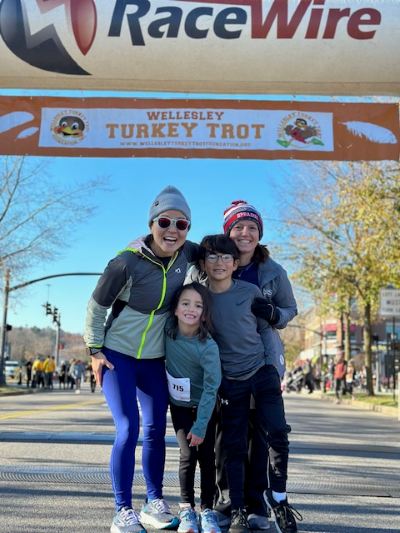“I Truly Feel I’m Able To Be Who I Am at Boston Scientific”

When Jenny Lee was in middle school, her classmates aspired to be astronauts or the president of the United States.
But Lee?
“I wanted to be the CEO of Coca-Cola,” she says.
While she ultimately steered away from soda and toward health care, Lee has always had her sights set on leadership. Today, she’s the VP of Global Digital Marketing and Customer Experience at Boston Scientific, advancing the company’s commercial and digital capabilities to ensure they meet the needs of customers, patients and consumers.
For Asian American and Pacific Islander (AAPI) Heritage Month, Lee talks to us about how her culture has influenced her career – and how Boston Scientific has supported her along the way.
Q: Tell us a bit about your childhood.
I grew up in Tallahassee, FL, as a first-generation American, the youngest of three girls. My parents came from Korea to get their PhDs.
When I looked around at my friend group, there weren't a lot of people that looked like me. But I didn't realize that I was different for a very long time.
Q: When did that difference start to become clear to you?
One day, on the bus, a student came up to me and in a very negative tone said, “How come you don't have any eyelashes?”
It didn't make sense to me, because I didn't know my eyes were different. I went home and I started to talk with my parents about it. My being different became very clear, and also the impact that it had on the people around me.
Q: Asian Americans are underrepresented at the highest levels of their fields, due to a mix of organizational and cultural factors author Jane Hyun calls the “bamboo ceiling”. Is this a concept you can relate to?
I do think it's real. The ability to see yourself in those above you is important. When I look at CEOs of other companies and even leadership within my own company there just aren't a lot of people who look like me.
That said, I feel like my “bamboo ceiling” is a bit self-imposed. Cultural values can be so engrained, and my upbringing and familial values around discipline, achievement, deference to authority, self-effacement and harmony are sometimes in discord with business needs and priorities.
For instance, when people give me kudos, my first instinct is to push it away. My mentors tell me to own my successes. But that is still very difficult for me.
The second thing is speaking up in meetings. In the back of my head, I ask myself so many questions: am I not giving someone else the space to speak? Is someone else going to say this anyway?
There is a point as a leader when you wonder, “Am I good enough? Or am I getting these roles because I am diverse?” To be honest, I still struggle with it.
Q: Do you feel you have been treated differently in the corporate world because you’re a minority?
As I get more senior in my career, and especially at Boston Scientific, the subtle, day-to-day microaggressions have been minimized. I identify as LGBTQ, and I feel more microaggressions because of that piece of my identity than from being Asian American.
Every company has their values. But we lean into the caring value so hard at Boston Scientific. At all levels of the organization, I feel like people are open to what you have to say, and because of that culture, your ability to make an impact is enormous. I truly feel that I'm able to be who I am and deliver as best as I can at Boston Scientific.
Q: How were you able to break through your own “bamboo ceiling”?
Being aware of the discord between my cultural values and workplace values has been essential. Knowing that I’m in an environment where I feel safe to speak up and that I don’t always have to defer to someone more senior or have 100% alignment from every stakeholder to move the needle forward has been critical. As I have more experience, I gain more confidence in this area – but it’s a muscle I am constantly building.
Finding mentorship is critical to anyone’s success. I make a point of being proactive about networking, whether it’s through employee resource groups or keeping in touch with former managers.
I also try to keep a learning mindset, staying open to growth and betterment.
And I see it as my responsibility to help pull others up. I hope that I am leading by example and paving a path that in the future becomes easier for others.
Q: What would you say to people want to support their AAPI colleagues in the ways you’ve felt supported?
Attending employee resource group events, reading books and simply talking with your AAPI colleagues are great ways to learn more about what they’re going through and the whys behind their values. It can be helpful to give them grace and space to push their cultural boundaries.
I am so grateful for my allies—people who support me and all my intersectionalities and take time to appreciate and understand my background. So for all of the allies out there, thank you for trying. It may not always go perfectly but leaning into that is where we all grow and come closer together.
Boston Scientific is committed to fostering a diverse, equitable and inclusive workplace where all of our employees can bring their authentic selves to work and thrive personally and professionally. See our objectives and progress to date in our recently released 2022 Performance Report.
View original content here

